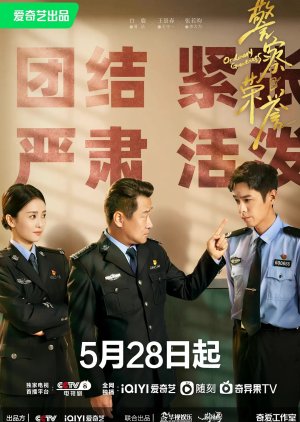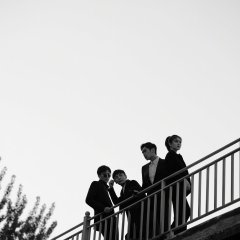Li Da Wei et Xia Jie sont de jeunes recrues qui rejoignent ensemble la police. Ils vont alors devoir faire face à une charge de travail à laquelle ils ne s'attendaient pas, aux pressions sociales et aux changements causés par l'arrivée de nouvelles technologies dans la police. Cela les amènera à douter d'eux-mêmes et de leurs rêves qu'ils n'abandonneront pas. (La source: Nautiljon) Modifier la traduction
- Français
- English
- magyar / magyar nyelv
- עברית / עִבְרִית
Où regarder Jing Cha Rong Yao
Subscription (sub)
Distribution et équipes
- Zhang Ruo Yun Rôle principal
- Wang Jing Chun Rôle principal
- Xu Kai Cheng Rôle Secondaire
- Noah Cao Rôle Secondaire
- Li Ning Rôle Secondaire
Critiques

PeachBlossomGoddess
42 personnes ont trouvé cette critique utile
The sum of ordinary is great.
Wow. I did not expect to enjoy this drama so much. In fact I didn't expect to get past the first episode. But I just had to check it out for the spectacular cast. And I am well chuffed that I did. It is the most eloquent and engaging low concept drama made in years.Wang Shouyi is chief of the chronically short staffed Bailihe People's Police station. With a 93.4pct community satisfaction rate, they rank 144 out of 163 in the district. These are not elite cops trying to solve major crimes. They are just ordinary cops that grapple with mundane, daily cases from petty crimes to heated community spats. The denizens of their community are a loud, colorful, chaotic, demanding, often ignorant, unreasonable and utterly exasperating lot. This is written authentically with a strong dose of humor and irony that garners big laughs from small things such as an absurdly moving case of diaper theft. It is an intricate, intimate account of the broad array of everyday social pressures experienced by Chinese society. This brilliant, unglamorous drama that feels like a shared coming-of-age experience traverses the bleakest, most flawed to the greatest, most compassionate aspects of humanity.
Wang Jingchun's canny Chief Wang is the star of the show. He badgers his director into assigning four new recruits with diverse abilities and backgrounds to his station. With wisdom and perspicacity, he assigns an experienced mentor to each of the bright eyed and bushy tailed young recruits. This excess of greenness and enthusiasm is met with a mixture of annoyance and trepidation by the battle hardened veterans. Prodded along wisely past hiccups by Chief Wang, adjustments are needed on both sides to make these seemingly random pairings work out. Over time, their shared trials and triumphs end up being a catalyst for character growth all around.
Xia Jie's father, the former well loved chief of Bailihe station perished in the line of duty ten years ago. Her mentor Cheng Hao was mentored by her father and like Xia Jie, seeks closure from what happened so long ago. She is treated like a protected species by her father's comrades and her mom hounds the station to keep her out of harm's way. My blood boils every time her mom goes on a rampage. But as much as I am frustrated and angry at her, I can't help but be moved by her sheer terror and deep sorrow, at how time did not ameliorate the shock and intensity of her loss. I really applaud Bai Lu for her true to life portrayal of Xia Jie's struggle to make peace with the past, find meaning in her role at the station and built life bonds with her peers. I also love that the drama only hints of awareness that could blossom into romance down the road but keeps the primary focus on the camaraderie and burgeoning mutual understanding that turns the four young friends into found family.
Liu Dawei is the other super solid characterisation of a young cop with rough edges that offers the barest glimpses of another Chief Wang in the making several decades down the road. On paper, he is the least promising recruit, a trouble maker at the bottom of his enrolment class. But he has high EQ and it is as much his kind nature as his inherent nosiness that gets him embroiled in everyone's business. His mentor Chen Xinsheng is initially very irritated to be saddled with this brash and over talkative young man with an instinct to rush headlong into danger. Their relationship and how it evolves on multiple fronts and interlocks with the other characters is the best written and portrayed dynamic in the drama. This is not at all surprising that magic happens when you put together immersive and versatile actors of Zhang Ruoyun and Ning Li's caliber.
Xu Kaicheng also delivers a very respectable performance as the book smart Yang Shu, the perfect foil for the street smart Liu Dawei. His struggles with Cao Jianjun his ethically flexible mentor with hero complex, is forced at some emotionally complex moments but overall comes off well. He is surprisingly good at comedy - I laughed the hardest when he is pimped out by the station as an undercover gigolo. I also much enjoyed the stingy Zhao Jiwei's great relish and talent for self criticism and his eye for detail in the cracking of the diaper theft case. This memorable ensemble cast would not be as well rounded out or grounded in reality without Zhao Jiwei and his mentor Zhang Zhijie's focus on how it is the small things that make the biggest difference.
This slice of life drama is far from a fairytale - It doesn't try to suggest that life is fair or bad things don't happen to good people. It resonates because it is simply about coping with life's daily challenges. The outcomes are not always just and success and failure do not necessarily correlated with good or right decisions. All four of these young recruits come with baggage and are mentored by battle scarred veterans with their own issues. Their flaws and personal traumas enable them to process and respond to situations with compassion and compromise and thus not always to the full letter of the law. They may just be ordinary cops trying to be their best selves but together they prove that the sum of ordinary is great.
It is normal for these types of slice of life character dramas to be light on plot but the final arcs do dial up the complexity and intensity of the cases as the young recruits gain experience. While the drama does end at a climax, I would have preferred that they ended this on the penultimate gaslighting/cyber crime case. This drama was never about heroes so I am not sure we need to see history repeat itself with another Xia Jie in the making ten years down the road. It isn't a bad final arc at all it just strikes a bit of an odd note with the rest of the drama. That does not change that this is an immensely enjoyable story that made me reflect a bit, laugh a lot and tear up occasionally. I am rating it my first 9.0 for 2022.
Cet avis était-il utile?

Cette critique peut contenir des spoilers
An excellent slice of life in a Chinese grassroots police station
This is a slice of life in a Chinese suburban police station, with trainees who need to be enlightened, and public as well. Some things here are a bit old-fashioned, like everyone taking part in the cleaning of the premises, but people have been used to it from when they were school kids, in many mostly rural places, so it is not unlikely. The station functions as a complete work unit "danwei" which offers shelter and meals and more to the workers. It works together with the local community centers and governing bodies, to ensure peace and safety, i.e. "serving the people".But like in every country, police is both looked up to and feared, sometimes hated, so they are now also under the scrutiny of the smartphone wielding public who will take pictures to be exposed in social media, despite it being forbidden. Many things here are rather realistic, and could be somewhat comparable to police work anywhere, but it is just a drama, not a documentary , so there is some humor too.
The earliest type of movie from China in that vein that I saw, was Ning Ying's 1995 民警故事 (On The Beat) where "Under the tutelage of a tough colleague, a rookie cop yearns for excitement on the streets of Beijing." A very good but dark movie too. At the time, pet dogs were banned because of risk of rabies, and petty criminals and pickpockets like Jia Zhangke's 1997 小武 (Xiao Wu) were the main fare of urban police work, outside the flashy kung fu fight epics like Hong Kong movies 1985 Police Story, or closer to our times Andy Lau's 2002 action thriller 無間道 (Infernal Affairs).
In this “Ordinary Greatness” drama, aspiring policeman Li Dawei (played by ML Zhang Ruoyun) must have been influenced by such thrillers to choose that line of work, where much of the work could now just be the boring community watching and resolving conflicts, preferably before they flare up, like the complaint about the noisy neighbors (something that is near universal).
Young female aspirant Xia Jie (played by Bai Lu) has been overprotected by her still PTSD suffering mom, since her father died a hero, knifed in action. She hoped to find a way to get independent after Police academy. But she was also being put aside from dangerous missions like arresting murderers, where her mentor, deputy chief Cheng Hao (played by Wang Tong Hui) continued the overprotection.
Rookie Zhao JiWei (played by Cao Lu) was chafing at the boredom of checking monitoring footage. Following his cheerful master Zhang Jijie (played by Li Xiao Chuan) did not bring much more than helping kids and pets, and interacting with residents of a new community of former rural villagers who had trouble adjusting to life in the city with its bans on using electric wires hanging from windows or setting up stalls to sell produce on the streets.
Polar opposite was Yang Shu (played by Xu KaiCheng) who was the odd one out of the four new recruits , with his Master's degree in law, from prestigious university Beida. He thought he was going to fit in when he saved a life together with his mentor Cao JianJun (played by Zhao Yang) but was disappointed when Chief Wang ShouYin (played by Wang JingChun) upbraided them for recklessly endangering their own lives.
Putting safety first is indeed a requisite : ordinary police are not armed forces in China. Except for special missions and special forces, which you'd rarely see on the streets, they are more like British "bobbies" who used to only wield a stick. Their principal "arm" used to be a talkie walkie, now it's a phone, and they wear a recording device if they are on medium risk missions. In fact, apart from traffic regulating police, and alcohol tests at certain well known road junctions, you don’t see many policemen patrolling in China. Maybe they are understaffed (because not the best income and prestige, so not a very attractive profession) like it’s hinted at, in the beginning of this drama ?
The drama does not showcase many flashy crime investigations, because that is not the domain of grassroots police like the ones staffing Balihe station, but that of criminal police under another station, with which they have occasional cooperation. The main fare is solving disputes and petty thefts, with the help of the public, in accordance to the policy of “Fengqiao experience for the New Era” (新时代”枫桥经验”)" i.e. "mobilizing the public – including through new digital tools. The Fengqiao experience is a system going back to 1960s Mao era "social and political governance that essentially directed the masses themselves at the local level to carry out the on-site “rectification” of so-called “reactionary elements” and ‘class enemies” in society, largely forgotten after 1980. It is named after Fengqiao Township (枫桥镇), which is today a part of the city of Zhuji in Zhejiang province. Although it seems unsuited to a contemporary China ostensibly ruled by law under the Constitution, the “Fengqiao experience” has made a prominent return under Xi Jinping in 2013, entering official language about rule of law and public security.
The use of such slogans as guidelines for work is showcased in the periodical meetings in the police station, with Chief Wang or Instructor Ye Wei (played by Qi Xiang aka Qi Huan). She is particularly subjected to stress, having to juggle her job and her duties as mom of an unruly kid with school summons to go discuss with the teachers, and elders with flagging health who sometimes need hospital care simultaneously. But she can count on the group's resilience and readiness to stand in for her in case of need.
The drama also focuses on the personal problems of the people working in the police Policemen need to take care of their children and of their elderly and ailing relatives too, and also pay special attention to former member’s families, like Xia Jie’s..
The four young recruits soon become friends and share an apartment found by Li Dawei’s mom, close to the station, despite Zhao JiWei’s stinginess, due to his poor rural upbringing. But this apartment also proves useful as a haven for troubled Jia, the daughter of Dawei’s mentor policeman Chen.
Li Dawei’s mom, an exceptionally cheerful and practical woman, with a healthy relation with her son, is not very rich, having had to bring up her son alone, because his father absconded for ten years; so his sudden reappearance cause Dawei to be extremely angry, until he finds out the real reason and accepts his father. Later, he shows his perseverance and astuteness in helping to solve two difficult cases, one about an internet scam targeting naïve persons to defraud them of their possessions, and another about a serial killer.
Controlling emotions is a necessity for policemen who are subjected to witnessing distressing situations and need to stay calm even when they are targeted by unreasonable citizens
Xia Jie is growing from a naïve and righteous person to a more careful officer, protecting her mom despite annoying interferences with her work, also by a crazy woman doctor who is suffocating her daughter a bit like Xia Jie was. She chafes at the idea of being relegated to Household Registration duty until she finds out that this sort of work is also quite interesting and can bring help to people.
We don’t get to know tall and handsome Yang Shu’s family : he stays discreet, but his mentor Cao JianJun has a troubled family, with a haughty and materialistic mother-in-law who keeps grating at his insignificance; this will eventually cause Cao JianJun to shine and to fall, after having reconciled with the young man whom he at first was jealous of. But he always strove to be a hero and will not disappoint.
Some episodes felt like a kaleidoscope and might get a bit tiresome for those tempted to binge watch the drama, It is better to watch this drama without too much haste. The story as a slice of life is interesting as it showcases the ebb and flow of work in the police station. My attention flagged a little in episode 23 after two days of almost nonstop watching. But episode 24 woke me up with the serious problems cropping up, and cheerful Chief Wang, the universal troubleshooter, losing his smile. And I stayed till the end, admiring the excellent acting and the variety of trouble they addressed, some serious ones too, that could be of concern for anyone anywhere, in our changing cities and internet age, while taking some notes about particular things of special interest.
Generally, the actors do an excellent job at showing their individuality, so we quickly get drawn into their family and work preoccupation : each one is different, and we soon feel drawn into this extended family of sorts that make the Balihe police station a “home” for the policemen. But even if Dawei seems more than just friendly with Xia Jie in the later episodes, they have no time for romance. The focus is on duty, and loyalty to the people they are serving, and the end of the drama shows satisfactorily the honors gained by each in the station.
Cet avis était-il utile?





















































